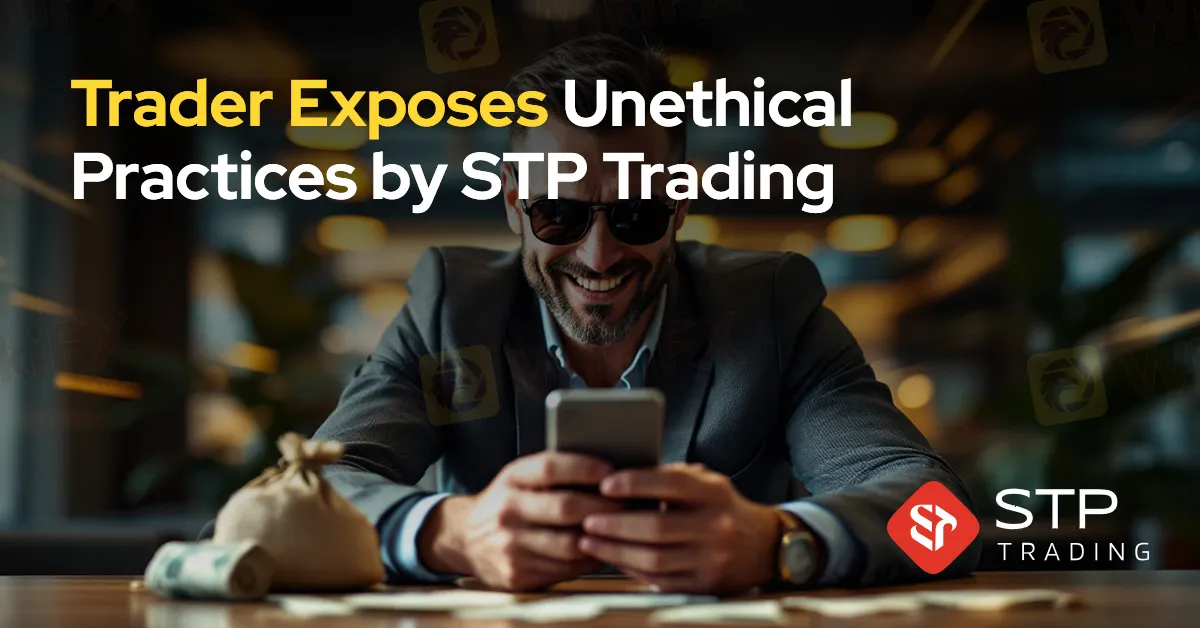简体中文
繁體中文
English
Pусский
日本語
ภาษาไทย
Tiếng Việt
Bahasa Indonesia
Español
हिन्दी
Filippiiniläinen
Français
Deutsch
Português
Türkçe
한국어
العربية
Trader Exposes Unethical Practices by STP Trading
Abstract:A recent allegation against STP Trading has cast doubt on the firm's business practices, highlighting the potential risks faced by retail traders in an increasingly crowded and competitive market.

In the high-stakes arena of online trading, trust and transparency form the foundation of any credible broker-client relationship. A recent allegation against STP Trading, a broker with a WikiScore of 5.70, has cast doubt on the firm's business practices, highlighting the potential risks faced by retail traders in an increasingly crowded and competitive market.
According to the complainant, Esmaeil, their ordeal began with a $1,005 deposit into an account with STP Trading. After opening a position on XAU/USD (gold) with a lot size of 0.6, the trader closed the trade with a profit of $454—a result they had every reason to celebrate. However, what transpired next proved to be anything but ordinary.


The trader alleges that STP Trading abruptly closed their account without prior notice or explanation. Despite multiple attempts to retrieve the full amount due—including their initial capital and the profit earned—they claim to have received only $949, falling significantly short of their expectations.
The brokers actions raise critical concerns about transparency and client protection. Abrupt account closures without clear justification and partial fund returns not only undermine the principles of fair trading but also erode confidence in the broker's operational integrity. For retail traders, whose financial stability often hinges on timely access to their capital and earnings, such incidents are particularly damaging.

STP Tradings WikiScore of 5.70, as rated by the regulatory query platform WikiFX, reflects a performance that falls below industry benchmarks. WikiFX recommends a minimum score of 7.0 for traders seeking reliable and transparent brokerage services. Scores below this threshold, while not necessarily indicative of outright fraud, often point to operational inconsistencies or a lack of regulatory oversight—factors that can leave traders vulnerable to disputes and financial losses.
The implications of such incidents extend far beyond individual cases. Unresolved grievances and questionable practices tarnish the reputation of the trading industry as a whole, discouraging participation and diminishing trust in online trading platforms. Brokers must recognise that their long-term viability depends on maintaining transparent operations and prioritising customer satisfaction.

For traders, this case underscores the importance of rigorous due diligence when selecting a broker. Regulatory credentials, client reviews, and independent ratings on platforms such as WikiFX should serve as essential checkpoints in the decision-making process. Choosing a broker solely based on promises of high returns or appealing marketing campaigns is a gamble that can lead to significant financial and emotional setbacks.
STP Trading has yet to address the allegations or provide clarification regarding the traders claims. Until such a response is forthcoming, the case remains a stark reminder of the potential pitfalls in online trading.

Disclaimer:
The views in this article only represent the author's personal views, and do not constitute investment advice on this platform. This platform does not guarantee the accuracy, completeness and timeliness of the information in the article, and will not be liable for any loss caused by the use of or reliance on the information in the article.
Read more

The Hidden Checklist: Five Unconventional Steps to Vet Your Broker
Forex broker scams continue to evolve, employing new tactics to appear credible and mislead unsuspecting traders. Identifying these fraudulent schemes requires vigilance and strategies beyond the usual advice. Here are five effective methods to help traders assess the legitimacy of a forex broker and avoid potential pitfalls.

Doo Financial Obtains Licenses in BVI and Cayman Islands
Doo Financial, a subsidiary of Singapore-based Doo Group, has expanded its regulatory footprint by securing new offshore licenses from the British Virgin Islands Financial Services Commission (BVI FSC) and the Cayman Islands Monetary Authority (CIMA).

CFI’s New Initiative Aims to Promote Transparency in Trading
A new programme has been launched by CFI to address the growing need for transparency and awareness in online trading. Named “Trading Transparency+: Empowering Awareness and Clarity in Trading,” the initiative seeks to combat misinformation and equip individuals with resources to evaluate whether trading aligns with their financial goals and circumstances.

Malaysian-Thai Fraud Syndicate Dismantled, Millions in Losses Reported
The Royal Malaysia Police (PDRM) has received 26 reports concerning the Nicshare and CommonApps investment schemes, both linked to a major fraudulent syndicate led by a Malaysian citizen. The syndicate’s activities came to light following the arrest of its leader by Thai authorities on 16 December.
WikiFX Broker
Latest News
Top 10 Trading Indicators Every Forex Trader Should Know
ASIC Sues Binance Australia Derivatives for Misclassifying Retail Clients
WikiFX Review: Is FxPro Reliable?
Malaysian-Thai Fraud Syndicate Dismantled, Millions in Losses Reported
Trading frauds topped the list of scams in India- Report Reveals
YAMARKETS' Jingle Bells Christmas Offer!
AIMS Broker Review
The Hidden Checklist: Five Unconventional Steps to Vet Your Broker
WikiFX Review: Something You Need to Know About Markets4you
Revolut Leads UK Neobanks in the Digital Banking Revolution
Currency Calculator


